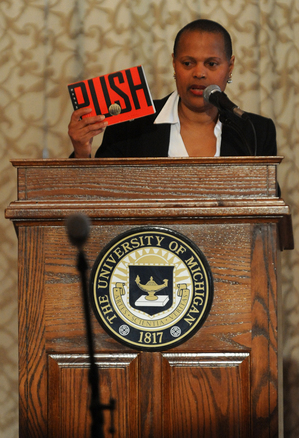Sapphire, author of "Push," delivers to a standing-room-only crowd
A huge crowd turned out to hear what the poet and author who goes only by the name Sapphire had to say — so big that by 10 minutes before her scheduled appearance at 2 p.m., all 600 or so seats in the Michigan Union Ballroom were full and a sign outside said that the talk would be simulcast at two other campus locations. Her novel, “Push,” was published in 1995 and was the story on which the recent movie “Precious” was based, so many in attendance had at least a passing familiarity with her work. Enough, at least, to know we wanted to hear more.

Audience members listen to author Sapphire read from her book "Push," which was the basis of the movie "Precious," during the University of Michigan Library's 2010 MLK Symposium in the Rogel Ballroom at the Michigan Union.
Melanie Maxwell | AnnArbor.com
The talk was part of the University of Michigan’s 23rd annual Martin Luther King Jr. Day symposium, and the composition of the audience itself could count as a triumph of King’s dream. There were balding domes and gray hair, high school kids and a few even younger and everyone in between, in nearly every shade that the globe offers. All there to hear the author of a story about a girl from Harlem who’s been raped by her father, abused by her mother and ignored by her school system.
Sapphire sneak began her remarks with a few thoughts on change from her perspective as an African-American writer. When she was 8 years old, she said, she turned in a paper to her “Negro teacher, as we said in those days” named Mrs. Duke, who looked right at her and said with finality, “You didn’t write this.” “I wondered what was wrong with me,” said Sapphire. “It took me the next 30 years to ask what was wrong with her.”
That was the end of her writing for a time, which was fine by her — dance class was more fun anyway, and then there was sneaking around with a friend whose father was an undertaker and looking at dead bodies. She wrote again in her twenties, works that haven’t survived the intervening time — “and they didn’t need to” she said definitively — but that caused her friends to look at her and ask, “Did you write that?” It was a question born of the belief, she thought, that maybe she shouldn’t. So she stopped again.
But she also stopped something else: reading Walt Whitman and Emily Dickinson. She filled herself instead with bold black women writers like Jayne Cortez, Lucille Clifton and Sonia Sanchez. She soaked up the black arts movement, full of black cultural nationalists whom she, on the outside looking in, felt were unified in their beliefs and their vision for the future.
And then came a moment when, she said, “if literature is a path, two walkers changed it.” Ntozake Shange wrote “For Colored Girls Who Have Considered Suicide/When the Rainbow is Enuf,” and Michelle Wallace wrote “The Black Macho and the Myth of the Superwoman.” Both “took the external gaze and turned inward,” explained Sapphire. “Black women began talking about their own men,” paving the way for Alice Walker and Toni Morrison.

Sapphire, author of "Push," which was the basis of the movie "Precious," speaks at the University of Michigan Library's 2010 MLK Symposium in the Rogel Ballroom at the Michigan Union.
Melanie Maxwell | AnnArbor.com
“Black women will always be catalysts. We’re stepping out of Black Power and white feminism. African-American women turning their gaze on black men, white men, themselves — they gave me back my voice, taken by Mrs. Duke. All who care to enter the path, can do so.”
Still — and she told us that she was aiming her next comments squarely at the group of high school students seated in one corner — the writing wasn’t easy. “Push” was her fifth attempt at a novel, clearly representing the “try and try again…and try again…and…” approach that getting the words on the page to paint the picture you want it to sometimes requires. “The idea that I could write was planted,” she said, “but the ability to do so came later.” But in 1995, when her MFA classmates were crossing the stage to get their diplomas, she was meeting with an agent to get “Push” published.
She read several excerpts, her beautiful elocution and delicate poetry-circuit hand motions occasionally at odds with "Precious"’ gritty dialect (but all the better for detonating the F-bombs, which sometimes came as an incongruous surprise).
When the floor was opened up for questions, the line in front of the microphone never shrank below 7 or so eager folks, and she proved as engaging in dialogue as she was alone in the spotlight:
• Could she tell us more about the current status of literacy programs like “Each One Teach One,” which was based on a program she worked for earlier in her career? They’re gone, she said, eliminated in the mid-1990s welfare reform that encouraged all recipients to take minimum-wage jobs.
• What was her muse for this novel? All of the characters are composites based on young women she came across while teaching in Harlem — “fantastic characters to you,” she noted, “but common to me.”
• Did she like the movie version of her book? Loved it, loves filmmaker Lee Daniels, and even got to sit in on some of the casting.
• Any advice for educators? Take care of yourself and the conditions under which you teach so that you don’t burn out in five years.
• Any advice for writers? Make a commitment to your craft, and take every opportunity you can to learn from other writers.
An interesting thread began when a high school student asked about the book’s relation to younger readers. Even though the protagonist is a 16-year-old girl, said Sapphire, “I didn’t think kids would read it. But at first, the adults for whom it was written couldn’t take it. And it was high school and college kids who kept it alive. … If it had been up to the adult black middle class, this book would have died an early death.”
This discomfort bumped up against a theme that was most explicitly addressed by a woman who came armed with quotations from an online review of the movie which could be boiled down to the worry that it portrayed black men as predators, unnecessarily fueling harmful stereotypes.
“What are we going to say about that?” asked Sapphire. “Forty percent of women say they’ve been abused — and many more don’t say it. I’ve never walked out of an action thriller where some guy mows down 20 or 30 people, just kills until he gets tired of killing, and heard people say that kind of thing. (The abuse dealt with in “Push”) is stuff we see in the paper every day, but as an artist it’s my job to bring it to you. And you don’t have to watch it — if you want to watch nothing but ‘The Frog and the Princess,’ I’m cool with that. But I’m hoping that those who do see it, see it as a redemptive story. I happen to be black, so I write about black men. But there are white women who write about being raped by their white stepfathers, and an Asian writer would write about Asian men.
“And I’m gonna do it again.”
Leah DuMouchel is a free-lance writer who covers books for AnnArbor.com.


Comments
Vanessa Mayesky
Tue, Jan 19, 2010 : 9:49 a.m.
"Each one teach one" is not gone in Washtenaw County. To tutor an adult, contact Washtenaw Literacy (info@washtenawliteracy.org, 734-879-1320). To tutor a young person, contact Family Learning Institute (amy@familylearninginstitute.org, 734-995-6816). Both groups have students who need your help!
marylea
Tue, Jan 19, 2010 : 8:36 a.m.
Well written and informative review of the event. Wish I could have attended.